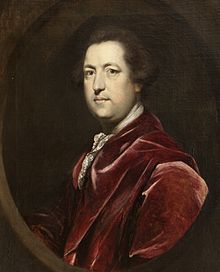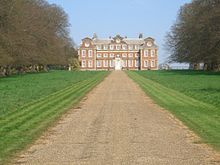Charles Townshend (politician)
Charles Townshend (born August 29, 1725 in Raynham Hall , Norfolk , † September 4, 1767 in London ) was a British aristocrat and politician.
Charles Townshend was born the second son of Charles Townshend, 3rd Viscount Townshend and his wife Audrey on the family estate of Raynham Hall . Audrey Townshend was known for her openness and quick-wittedness, qualities that she passed on to her son. Townshend studied at the University of Leiden in the Netherlands from 1745 together with a small group of other British people who later became well-known personalities, including the politicians William Dowdeswell , Wilkes and Reverend Alexander Carlyle , who wrote down some of their experiences there in his autobiography .
From 1747 to 1756 Townshend represented the constituency of Great Yarmouth in the House of Commons as an MP , then Saltash until 1761 and then Harwich . He first attracted public attention in 1753 when he fought against the Marriage Act of Philip Yorke, 1st Earl of Hardwicke , which put marriages on a stricter legal basis. His strong opposition to this law, which was passed, is explained by the fact that, as a younger son, he was dependent on marriage to a wealthy heiress. In fact, in 1755 he married Caroline Campbell († 1794), the eldest daughter of John Campbell, 2nd Duke of Argyll and widow of Francis, Lord Dalkeith, son of Francis Scott, 2nd Duke of Buccleuch . The couple had two sons and a daughter; the sons had no offspring.
Political career
In April 1754, Townshend, who had been a member of the Board of Trade since 1749 , became Lord of the Admirality . In 1755, however, he had to resign from this post after sharply criticizing the Admiralty's policies. But the following year he was given the lucrative office of Treasurer of the Chamber . However, when he wanted to install one of his partisans, Sir William Burrell , on the Board of Admiralty and this was rejected, he resigned again. In 1766 he became Chancellor of the Exchequer under Prime Minister William Pitt . With Pitt becoming seriously ill shortly thereafter, Townshend became the strong man in government. He was generally regarded as a brilliant and eloquent financial politician, but ultimately lacked political instinct.
As Chancellor of the Exchequer, Townshend advocated that the tax on real estate should be maintained at the current level (four shillings to one pound ) against efforts to reduce this tax by one shilling, but this did not succeed. This process meant a major political defeat for Pitt, who increasingly developed aversion to Townshend, who also did not always obey Pitt's instructions. However, since Townshend had great political influence, Pitt refrained from removing him. Townshend tried to compensate for the deficit in the treasury due to the reduced tax revenue with new sources of income in America. So he devised new taxes on various goods such as glass, paper, and tea when they were exported to America, collectively known as the Townshend Acts . That should bring in an additional £ 40,000 in taxes. The consequences of these tax laws and the opposition in the colonies were ultimately responsible for the Boston Tea Party and the American Revolutionary War .
Charles Townshend died unexpectedly only a little later.
In 1753 Townshend in Vermont was named after him.
literature
- Percy Fitzgerald: Memoir . 1866
- William Edward Hartpole Lecky : History of England . 1892
- Horace Walpole : Memoirs of the Reign of George III. 1894. Edited by GFR Barker
- Reuben Percy / Sholto Percy: The Percy Anecdotes . 1823
Web links
| predecessor | Office | successor |
|---|---|---|
| Wills Hill |
Treasurer of the Chamber 1756-1761 |
Francis Dashwood |
| Henry Fox |
Paymaster of the Forces 1765-1766 |
Frederick North and George Cooke |
| William Dowdeswell |
Chancellor of the Exchequer 1766–1767 |
Frederick North |
| personal data | |
|---|---|
| SURNAME | Townshend, Charles |
| BRIEF DESCRIPTION | British aristocrat and politician |
| DATE OF BIRTH | August 29, 1725 |
| PLACE OF BIRTH | Raynham Hall , Norfolk |
| DATE OF DEATH | September 4, 1767 |
| Place of death | London |

